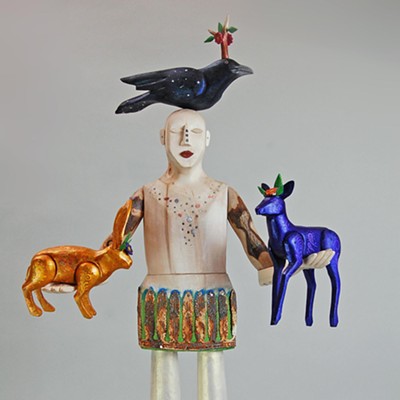Bob Log III fans might recognize all of this, but Scott Biram's only costume is the shirt and jeans he put on this morning: What you see is what you get, along with plenty you couldn't see if he weren't inclined to show you. And he's so inclined.
A chicken-bone tattoo marks the only obvious vestige of Biram's run-in with an 18-wheeler. If you want, he'll also show you the ragged scar that runs from his belly to his heart.
"I got hit head-on going 75 miles an hour on a four-lane highway," he says. "It broke everything in my body."
Something like that might change a person, maybe even make him psycho. The wails, hollers and stomps in Biram's live performance can give you that impression. Biram's scariness, though, comes mostly from how fearlessly he expresses emotion, with a lack of inhibition foreign enough to most of us that his power and vulnerability seem unnatural, even insane.
"I kind of pride myself on being able to release my emotions freely and not hold back at all," he says. "So many people these days have timid little weak voices like they're scared to belt it out." Or maybe they just don't have all that in them.
Biram was a punk in high school--he played guitar in a punk band and loved the club scene. In college, though, he came by a banjo that seemed to change everything. "I started listening to more of the stuff I listened to as a kid--Doc Watson, Leadbelly and stuff like that. I started doing more singer-songwriter shows with just my acoustic and singing Townes Van Zandt and Bob Dylan and the usual suspects."
One day, he played an old dance hall with a wooden floor, and found he liked stomping on the floorboards. After that, he started stomping on the mic stand for more volume. That led to experimenting with his own stomp boards, and then with other noisy things. He found that a harmonica mic made his voice sound really weird--and he liked that, too. All the while, he was writing his own songs about hard times and low life, about truck driving, frustration and women with love "like gravy."
"I missed playing in punk-rock clubs," he says. "The only way for me to compete with rock bands, to even be allowed to play in them, was to turn it up." So he did, adding amplifiers and pedal effects to the point that his loaded van looks like a Rubik's Cube inside.
It's been a while since Biram released a record, and although he's working on a new one, he doesn't like to leave the road for long. Having already toured behind his 2006 Graveyard Shift, he's gotten creative about offering merch that might appeal to fans who may already have bought the record. "I made some goodies," he says "and some skateboards with a design on them, more like a wall decoration than something to actually skate on. I mean, they're good skateboards."
Biram's work ethic comes from his grandfather, a man he idolizes. "I wear the same kind of shoes my grandpa wears to church every Sunday," Biram says of his canvas slip-ons. "My grandfather was a pilot in World War II, and he's been a deacon in his church for, like, 50 years."
Biram may wear the shoes, but he's not a religious man, so it's startling to hear him holler at the Lord from the stage, in exhilaration or a fit of fury. "It's just a way to rejoice," he explains, "and then there's the whole angry side of my music where I'm just getting shit off my chest. A big influence on my music is Southern-black gospel, and you can hear people's souls in that kind of music. And in chain-gang songs when people had nothing else to live for except their songs. That touches me."
It's almost impossible to avoid being touched by the emotion of Biram's music. Something in the fierceness of his exposure wills away the veneer of our socialization just enough to recognize ourselves in it, and to own up to the outrage and the joy--even the tenderness we're much more comfortable concealing. Call it a catharsis, of sorts, but there's not that much drama in it. It's just a poking up, to our delight or disgust, of our humanity.












